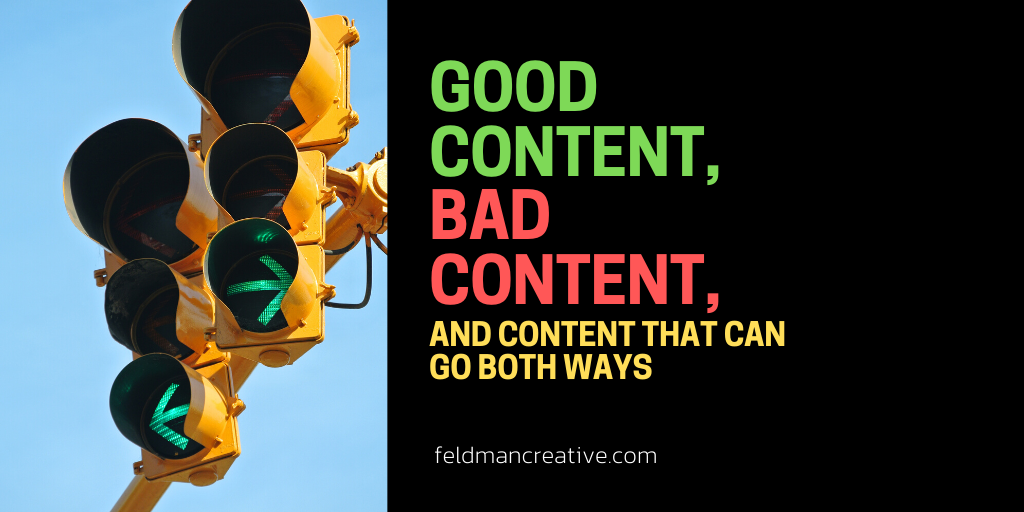For a few years now, there’s been so much talk about “the death of the copywriter.” Granted, the death of copywriting, or the death of just about anything, makes for alluring headlines. Us humans appear to be magnetically attracted to obituaries.
Content marketing is alive and well.
Content is king. Content is currency. You’ve seen these theories and bought into them or you wouldn’t have given an article about content marketing a minute of your valuable time.
What is content? The Content Marketing Instituterecently offered the 2011 edition of their Content Marketing Playbook, which features 42 ways to connect with your customers. Let’s allow the title of that killer piece to define content. It tells us what content is andwhat it’s for: a way to connect with customers. We might as well call it a great definition of marketing, too, because it is.
So, do you want some?
You definitely do. As a consumer, you endlessly seek the solutions to your problems. As a marketer, communicating with your customers is essentially your job description. These truths are so old and universally understood, they’re practically commandments. But wait a sec…
The web changed everything.
Thought leaders around the world agree: when you establish a presence on the web you become a publisher. However, the notion that often follows goes something like this: now that you’re a publisher, you need journalists to create your content—not copywriters.
I beg to differ.
Yes indeed, the web has changed the media landscape in a big, big way. The vast majority of professional copywriters must master web-based communications to thrive. What’s more, marketers themselves are swiftly changing their approach as they grasp and apply the tenets of inbound marketing, as demonstrated by decreased investments in traditional advertising and increased investments in the creation of valuable content.
Having said all that, I hope this article helps answer the simple question, “How do I create valuable content?”
Forgoing copywriters is not the answer.
It’s a formula for failure. Copywriters specialize in persuasion. You can make the case (as many spectacular authors have) that in the inbound era effective marketers wisely choose not to cram their content full of product-centric messages. However, if building a relationship or connecting with the customer trumps generating an immediate sale, you’d be crazy to suggest persuasion is disposable. Or at least you’d be wrong.
Persuasion is still the main ingredient.
You can slice and dice the content creation model any way you want and take apart and analyze any individual link in the selling chain, but you’re bound to arrive at the same conclusion:
If content is king, it rules from a throne called persuasion.
What’s new? What isn’t?
What’s new: the recipe for success is content marketing. The web is where people go to find content. The web is where people shop. Your customer is far more empowered now. Offer her tools to inform her buying decision and she’ll gladly help herself to them.
What isn’t new: the tools your customers value—your web pages, downloadable resources, how-to articles, white papers, e-newsletters, blogs or what have you—should compel your customer to do something. It could be click. It could be call. It could just be comment, share, tweet, register, enroll, or maybe even something as simple as come back again soon. But if your tools lack persuasion, if they fail to engage the audience and establish trust, they’re not effective tools.
Copywriters are your friends.
If to want to see your marketing investments pay dividends—and you haven’t honed copywriting skills—you want to put a professional on the job. Copywriters haven’t really died and they’re not evil. Get a good one to work on your content and good things happen:
- The headlines will be hooks.
Nothing ranks higher than the headline. The noise level in the media today is enormous. Readers are smart, selective and relentlessly attempting to ration their time. You get just a second or two to hook ‘em with a compelling headline.
- A story is told.
The craftiest copywriters weave the elements of storytelling into the content. Even if your story stars a storage device, a bottle of water, or a paper clip, it magically comes to life. Readers aren’t only educated; they’re entertained. - The message gets through.
Even in a search-centric world, CEOs outrank SEO. In other worlds, powerful writing should not give way to the almighty algorithm. Yes, of course, the content contains keywords, but the copy targets a living, breathing reader, not a robot, so it should be easy for everyone from clerk to CEO to understand. - Readers get rewarded.
The copywriter who’s going to make you glad you hired a copywriter will steer clear of the dreaded “me-me-me” approach and present the far more effective “you-you-you” style, which connects with the reader and rewards them for their interest. - Trust is established.
Copy that insists you can take advantage of this amazing offer now or never is not likely to gain the trust required to make a sale. The effective copywriter will help your company establish rapport with the reader by “listening,” feeling their pain, and offering helpful advice.
- Problems get solved.
Even if your content marketing education has instilled in you the notion that valuable content isn’t simply a marketing message—which is solid advice—don’t interpret this to mean your content should NEVER sell your solution. If the solution happens to be a product or service, you need not apologize for offering it. In fact, you should be thanked. The objective is to solve a problem. It’s a seriously simple principle. - The reader is inspired to take action.
Act now!!! Yeah, in most contexts that sort of language comes across as pushy and insincere. But ask yourself, why does your company do content marketing? The objective may not be to get the reader to enter a credit card number, but it absolutely should be to get them to do something. A good copywriter will tell the reader what action to take and a great one will make them feel great about doing it.
Yes indeed, your friend the copywriter has a big responsibility. Your marketing plan going forward is a recipe where content marketing is bound to be the entrée. So don’t skimp on the main ingredient. Put a professional in charge of cooking the content.
What type of experiences have you had concocting content? Please share them here.






